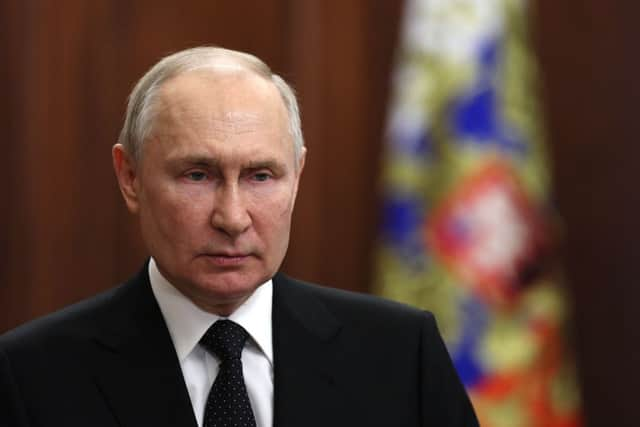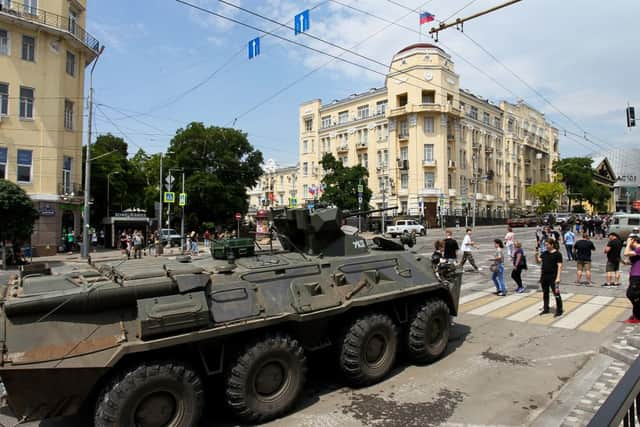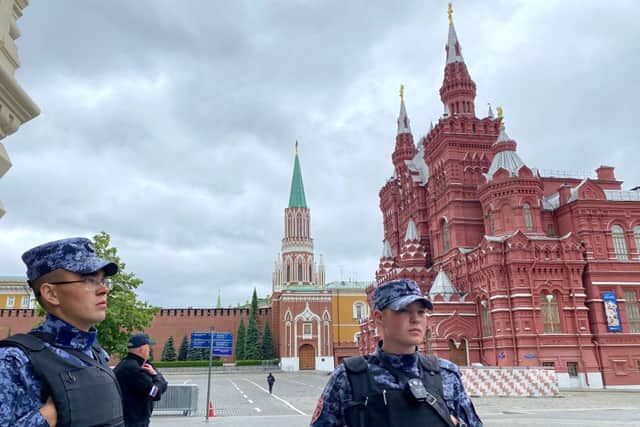Russia: what is happening? Wagner ‘armed mutiny’ end explained after Putin vowed ‘punishment’ for ‘treason’
and live on Freeview channel 276
The extraordinary “armed mutiny” in Russia appeared to come to an end late on Saturday (24 June) after the Wagner Group leader told his soldiers to end their march on Moscow in order to avoid “bloodshed”.
Russia had been facing an armed insurrection after Yevgeny Prigozhin, the head of the mercenary force, ordered his fighters to seize army bases at major city Rostov-on-Don, near the border of Ukraine. He said Wagner had taken this action as “revenge” on defence chiefs in Moscow, who he claimed were responsible for a strike against his forces while they were fighting on behalf of Russia in eastern Ukraine.
Advertisement
Hide AdAdvertisement
Hide AdPrigozhin threatened to also take control of Russia’s capital city, prompting the Kremlin to heighten security and put “anti-terrorism measures” in place across the country. In a speech to the nation, an incensed President Vladimir Putin addressed the situation - condemning the group’s “rebellion” as a “stab in the back of our country” and “treason” before he vowed that all those involved will be “punished”.
But before a further escalation, it was announced that Prigozhin would leave for Belarus. He said his troops would stand down so that “blood [would not be] shed”, and the Kremin later announced that criminal charges against the Wagner Group chief and his forces would be dropped.
This followed talks between Belarus leader Alexander Lukashenko and Prigozhin, which Putin reportedly agreed to. Here’s everything you need to know about the chaotic 24 hours.


Why was there a ‘mutiny’ in Russia?
In an astonishing escalation of infighting in Russia, Prigozhin, the head of Wagner, called for a rebellion against the country’s main army. He did this after accusing Russia’s military of carrying out a deadly missile strike on his troops, while they were fighting on behalf of Russia in the war against Ukraine. Russia’s defency ministry has denied this happened.
Advertisement
Hide AdAdvertisement
Hide AdPrigozhin denied he was attempting a coup - but quickly took over Rostov-on-Don and threatened to further march on Moscow. He asked for key military chiefs Sergei Shoigu and Valery Gerasimovn to be handed over to him, or else the rebellion would continue, adding in an audio message posted to Telegram on Saturday (24 June) that he and all of his members were “ready to die” in this action which he said was being taken “for the people” of Russia.
The mercenary chief also directly accused defence minister Shoigu of approving the strikes against the Wagner Group, saying that he had “put up helicopters to destroy our boys”. Shoigu “kills children”, Prigozhin continued, “throwing untrained soldiers, including conscripts, into war.”
It was not immediately clear how Wagner was able to enter the city of Rostov-on-Don in the first place - or how many troops he had with him.
Previously, on Friday (23 June), Prigozhin also said that Wagner “will destroy anyone who stands in our way.” In a series of video and audio recordings posted on social media, he continued: “We are moving forward and will go until the end.”
Advertisement
Hide AdAdvertisement
Hide Ad

What did Vladimir Putin say?
Addressing citizens on Saturday (24 June), without referring to Prigozhin or Wagner by name, the Russian President described the actions of mutineers as a “stab in the back” which he said amounts to “treason”. He vowed “punishment” for those involved, adding that “all necessary orders have been given” to deal with the crisis.
He pledged to defend Russia, telling citizens, in a sign of how seriously the Kremlin was taking the crisis, that a counter-terrorism regime had been put in place in capital city Moscow and several other regions across the country. He also directly appealed to those taking part in the rebellion, urging “those being dragged into this crime not to make a fatal, tragic, unique mistake”, and instead to “make the only right choice - stop participating in criminal acts”.
Speaking more broadly about the situation, Putin condemned the rebellion at a time when Russia is “fighting the toughest battle for its future” with its war in Ukraine. He said: “The entire West is waged against us. This battle, when the fate of our people is being decided, requires the unification of all forces, unity, consolidation, and responsibility.”
He slammed the rebellion as “a blow to Russia, to its people,” and said that those “who plotted and organised an armed rebellion, who raised arms against his comrades-in-arms, betrayed Russia. And they will answer for it.”
Advertisement
Hide AdAdvertisement
Hide AdPreviously, on Friday (23 June), Russia also announced that it had opened a criminal investigation into Prigozhin, following his claims of a strike carried out by its army.


Is there more context to the rebellion?
There has been tension between Wagner and Russia’s official army for a while as Prigozhin has repeatedly blamed defence minister Shoigu for high numbers of casualties on the battlefield in Ukraine.
“The war was needed so Shoigu could become a Marshal, so he could get a second Hero Star. The war wasn’t for demilitarising or de-nazifying Ukraine. It was needed for an extra star,” Prigozhin has said, both directly contradicting the Kremlin - and undermining Putin’s publicly-proclaimed reasoning for the war in Ukraine.
But Wagner still continued to aid Russia in the war, previously not levelling any direct challenge to Putin. However, following the ‘mutiny’, it is inevitable that the war in Ukraine will be impacted - but it is unclear as of yet what exactly this impact will be, whether any soldiers from the Wagner Group will join the army as offered, or what role in Russian politics Prigozhin could play in the future.
Advertisement
Hide AdAdvertisement
Hide AdHow did it all end?
Late on Saturday (24 June), the TASS news agency reported that Wagner Group mercenaries had been promised an amnesty if they lay down their weapons, but that “they should do it fast”. The office of Belarusian President Alexander Lukashenko then said he had brokered a deal with Prigozhin, who agreed to de-escalate the situation.
“Now the moment has come when blood can be shed,” Prigozhin said in a statement. “Therefore, realising all the responsibility for the fact that Russian blood will be shed from one side, we will turn our convoys around and go in the opposite direction to our field camps.”
Kremlin spokesperson Dmitry Peskov said the criminal case that had been opened against Prigozhin for the mutiny would be dropped, as it was confirmed that he would leave Russia for Belarus. Wagner Group fighters who had taken part in the uprising would not face any action in recognition of their previous service to Russia, Peskov added, and they would also be invited to sign a contract with Russia’s Ministry of Defence.
Pictures then emerged which showed Prigozhin and his Wagner Group troops being cheered as they left Rostov.
Advertisement
Hide AdAdvertisement
Hide AdWhat is the Wagner Group?
The Wagner Group (officially called PMC Wagner) describes itself as a “private military company”. They are essentially a band of mercenaries.
The group was first established in 2014, when it was fighting in support of pro-Russian forces in eastern Ukraine - but has grown considerably since then.
It has played a key part in the war in Ukraine, recruiting large numbers in 2022 when Russia was struggling to find people for its regular army. After years of denying that Wagner even existed, in July 2022 Kremlin-controlled media suddenly admitted that it was fighting in Bakhmut in eastern Ukraine - with the group’s troops playing a key part in the lengthy and costly fight to take the city.
Who is Yevgeny Prigozhin?
As the leader of Wagner, Prigozhin also became a key player in the invasion of Ukraine - although tension between him and Shoigu has long been clear. He is from St Petersburg, the same hometown as Putin.
Comment Guidelines
National World encourages reader discussion on our stories. User feedback, insights and back-and-forth exchanges add a rich layer of context to reporting. Please review our Community Guidelines before commenting.
